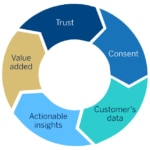How your data works for you
With the advent of big data, banks like BBVA are better able to harness the power of information to improve customer experience and provide advice, products and services - all personalized to your unique situation.

“Today, it’s less and less about selling a customer a single product,” said BBVA USA Director of Advanced Analytics Ekin Caliskan. “As an industry, financial institutions are shifting to focus on raising engagement by building high-quality, personalized interactions and relationships with the customers.”
Caliskan: As an industry, financial institutions are [focusing] on...building high-quality, personalized interactions and relationships with customers.”
In today’s world the diversity and volume of data is huge, and includes everything from market data to financial transaction details, product usage and behaviour, from which intelligence can be extracted. For example, it might be possible to predict that a certain customer might have a cash flow problem in the near future or, based on the data, the same customer may have a financial opportunity, such as a mortgage refinance.
“It’s called predictive analytics, which is essentially making predictions about unknown future events. Predictive analytics is based on the patterns found in historical data and it can be used to identify needs, opportunities and alerts for the customer and the bank,” Caliskan said. “Predictive analytics is a world where you log in to your mobile app and it presents you with advice tailored to your specific situation and needs, along with relevant product offers, like loan offers or savings account information.”
“As an industry, we may not be fully there yet, but with the data available - and technologies that allow us to transform data into customer centric opportunities - that’s where we are heading at a very fast pace."
Even so, says Caliskan, delivering the type of customer experience described above will require banks to ensure that customers understand the intended uses of their personal information. Some states are additionally considering requiring a customer’s consent before a bank might use the customer’s personal information to deliver these tailored services. The good news is that, according to the 2019 Accenture Global Financial Services Consumer Study, this sharing of data is something consumers are willing to do in return for products and services that make their lives easier.
Caliskan: At BBVA, we talk about a circle of trust as it relates to data, and we think it’s a concept that is vital to govern how and why we use customer data.
“At BBVA, we talk about a circle of trust as it relates to data, and we think it’s a concept that is vital to govern how and why we use customer data,” Caliskan said. “The thought is, essentially, to use customer data, we need to be transparent. Then, we provide value to the customer by using the data in the manner we’ve disclosed, and because of this, they are more willing to provide us with more detailed data, which we then use to create additional value. It’s a cycle, but one we cannot even begin without transparency.”

Caliskan went on to say that building this type of trust through delivery of meaningful personalized products, services and advice will allow the bank to deliver what Accenture terms in their report as an integrated proposition that addresses core needs.
Caliskan acknowledged that in asking customers to provide their data, banks have a serious duty to ensure its protection, and ensuring transparency to our customers and enforcing governance and compliance is essential.
Caliskan: Consumer trust is the currency that allows us to stay in business.
“We are asking customers to trust us,” she said. “We must reward that trust with better products, services and experiences, but also by making sure that we protect their data to the best of our ability. Consumer trust is the currency that allows us to stay in business.”